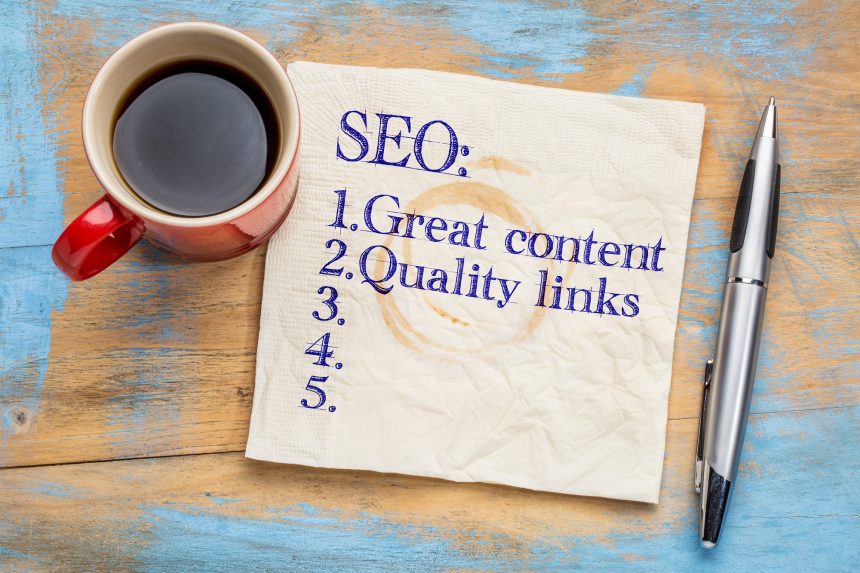Did you know that there are over 1.8 Billion websites on the internet at the moment? Whenever you type a query into Google, it needs to check every discoverable site for relevance to your search and rank them accordingly. This is where quick SEO tips come in handy.
- What Is SEO?
- 1. Make Your Website Faster and More Responsive
- 2. Optimize Your Site For Mobile Devices
- 3. Find and Fix All Broken Links
- 4. Encourage Other Sites to Link to Your Site
- 5. Write Content for Humans Not Machines
- 6. Write Amazing Meta Descriptions
- 7. Have an Internal Backlink Strategy
- 8. Simplify Your URLs
- 9. Optimize Your Images
- 10. Carry Out Keyword Research
- 11. Use an SEO Company
- Quick SEO Tips
The first page of the search engine results pages (SERPs) is where all of the magic happens. The site at the top of the list gets around a third of all clicks. The percentage slowly dwindles away to next to nothing by the end of the first page. By the second page, you’re not likely to see any action.
So, how do you improve your ranking position on Google?
In this guide, we’ll talk you through ten quick and easy SEO tips to help you make your mark on the first page of any search engine.
What Is SEO?
Before we share these SEO tips and tricks, we should first of all discuss what SEO is. SEO stands for Search Engine Optimization. It’s a set of processes that you can use to improve the ranking position of your website.
Quite literally, search engine optimization means optimizing your website for the benefit of search engines.
When the likes of Google come to sort through all of the websites on the internet to work out which sites are the most relevant to any given search term, they use powerful algorithms which use lots of ranking factors.
Having an understanding of these ranking factors will help you to improve your SEO game. Factors include the speed at which your site loads, the relevance of keywords to search terms, whether your site works on a range of devices, and whether your site is regarded as an authority in its niche.
There are four main types of SEO. These are:
- On-page SEO- which refers to the content that goes on your actual website
- Off-page SEO – which relates to the measures you take to promote your site
- Local SEO- which is about promoting your site in the local area
- Technical SEO- which is everything to do with the backend of your site that affects your ranking position
To improve your ranking in the SERPs, you should work on all aspects of your SEO.
1. Make Your Website Faster and More Responsive
The first of the quick tips to improve SEO is to boost your page load speeds.
Nobody likes to wait around for a website to load. In the age of 5G mobile internet and ultra fast fiber broadband, people expect information to be instantly delivered to their devices wherever they are.
If a site takes too long to load, chances are there is a competitor’s site that will offer the same information or deals in similar products and services. The quickest site to load is the one that will win the day!
Search engines know this fact. That’s why they make the speed of your site a ranking factor.
For this reason, you need to optimize your site so that it loads quickly. There are several ways that you can do this.
The first thing you should do is head to Google’s Page Speed Insights. Running your site through this online tool will help you identify exactly how fast or slow your site really is.
It will also tell you exactly what you can do to improve your page load speeds.
Some of the changes that it might suggest making will include compressing your images, using a lazy load plugin, deleting unused plugins and themes, and clearing your cache.
2. Optimize Your Site For Mobile Devices
Think about the way that you access the internet these days. Is it via a laptop, or through a smartphone mostly? Look around you on the street. You’ll see dozens of people accessing the internet from their mobile devices.
We’ve become accustomed to using smartphones and tablets to access the internet. So much so, we use them more than desktop computers and laptops nowadays.
But so many websites are behind the curve on this fact. And as a result, a lot of businesses suffer because their sites don’t load up correctly on mobile devices.
Again, the search engines such as Google and Bing understand that people are accessing the internet on a range of devices, from laptops through to smart speakers. Sites that are optimized for more devices will fare better as a result.
When optimizing your site for smartphones and tablets, think about how easy the text is to read on a smaller screen. Make sure that images load up to the right size too and are not too small or too big.
3. Find and Fix All Broken Links
Broken links that lead to dead ends, either on your own site, or on other people’s sites are not just frustrating for your visitors, they could be costing you business.
Again, having a site with lots of links that goes nowhere could be affecting your position in the search engine results pages.
To help find and fix any broken links, use a broken link checker plugin. This will help to make the job a lot quicker and easier and will save you the tiresome job of manually checking each and every link.
4. Encourage Other Sites to Link to Your Site
To get your website to the top of the search results pile, you’ll need to be regarded as an authority on the subject that you’re writing about. But how exactly can a search engine tell whether or not you know what you’re talking about?
One of the ways it does this is by seeing how other websites interact with yours. If other sites link to your content, then search engines see this as a vote of confidence in the content that you’ve created.
The more sites there are out there linking to you, the more votes of confidence you’ll get. But when your site is relatively unknown, how do you get sites to link to you?
There are a few ways you can do this. Firstly, you can approach influential bloggers and ask them if they would allow you to provide a guest post for their site.
A guest post means that you’d create an article. In this post, you could include backlinks to the content on your own site. The blogger gets some new and original content to keep their own site fresh and interesting, and you get a backlink. Everyone’s a winner.
The other way of going about getting links is to ask bloggers if they wouldn’t mind inserting links in their content.
5. Write Content for Humans Not Machines
Another of the best quick tips for SEO is to create content with humans in mind, not machines. This may seem obvious, however, many website owners get so hung up on the idea of pleasing the algorithms that govern ranking positions that they start creating content that is tailored toward machines instead of humans.
One example of writing for machines is keyword stuffing. This means forcing keywords into your content wherever possible to try and boost your chances of ranking for those phrases.
Keyword stuffing makes for bad content. It becomes almost impossible to read. If keyword stuffing worked, it might get you to the number one spot in the search engine results page, but readers would quickly turn away when they read your content.
Of course, again, search engines are wise to this practice and keyword stuffing won’t win you the favored top spot on the SERP. Instead, it’ll get you penalized.
6. Write Amazing Meta Descriptions
Meta descriptions are the first things that people see of your site when you appear on the search engine results page. The meta description is the small snippet of text that indicates to the reader what the content on your site is going to be about.
Most people will make their decision about whether to visit your site based on the meta description. If your meta description is bland, generic, or doesn’t give any information away, you’ll not be very likely to win over any new visitors.
Your meta description should be between 120 and 160 characters long. It should include your primary keyword, and also have a call to action that makes people want to click on the link.
Spend a bit of time crafting the best meta descriptions you possibly can.
7. Have an Internal Backlink Strategy
Internal backlinks are important. They serve two distinct purposes. Firstly, they are useful for directing visitors to other areas of your website. Secondly, they help search engines see how all of the content on your website relates to each other.
For these two reasons, you should make sure that every page on your site has at least one internal backlink. The longer the content, the more internal links you should include.
Make sure the pages that you are linking to are relevant to the content you are delivering.
8. Simplify Your URLs
It is essential that you use a URL structure that is simple and straight to the point. By minimizing your URLs, you’ll be helping both visitors to your site and search engines.
There are a few factors to do with URLs which may affect your SEO. These include:
- The complexity of the URL
- The number of subfolders there are
- Any repeated words in the URL
- The use of signs and symbols
If your URLs are too long, your site may become disorganized and it’ll be likely to make it harder for search engines such as Google to crawl.
9. Optimize Your Images
Everything on your site needs to be optimized, from your written content right through to your images. You may think that placing an image on your site is as simple as just uploading it, but you should make sure it is correctly optimized.
Your images need to be compressed so that they’re not too big that they slow your site down. You should also make sure that you use the image alt text tag.
The image alt text sits in place of your image when it won’t load. It also helps those who are visually impaired to get a good idea of what the image is. Using alt-text tags is also helpful to search engines that are crawling your site.
To make the best use of your image alt text tag, use a short description that best describes the image. This description should somehow include your primary keyword.
10. Carry Out Keyword Research
One of the best ways to improve your position in the search engine results is to make good use of keywords. Keywords help users to find your content. They are one of the building blocks of SEO.
When deciding what keywords to include in your content, think about what users might be searching for when they find your site.
Use an online keyword planner tool to do some research into the popularity of the phrase and how easy it will be to rank for it.
11. Use an SEO Company
Finally, consider using an SEO company to save you the bother of doing all of these things yourself.
A company such as Weber & Co. will have a proven track record in delivering effective SEO strategies that provide winning results. An SEO company will put you in front of your competitors in the search engine results pages.
Quick SEO Tips
Make use of these quick SEO tips to improve your position in the search engine results pages. Focus your attention making sure your site is responsive on every device. Write for human eyes, plan your keywords, optimize your URLs and your images, and use great meta descriptions.
For more great articles on a range of topics, check out the rest of the site.















